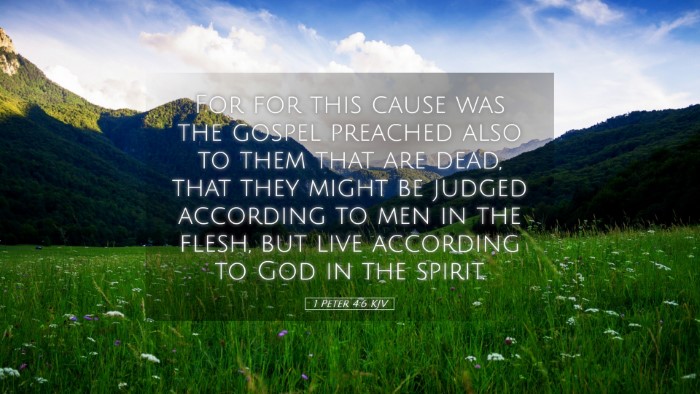Old Testament
Genesis Exodus Leviticus Numbers Deuteronomy Joshua Judges Ruth 1 Samuel 2 Samuel 1 Kings 2 Kings 1 Chronicles 2 Chronicles Ezra Nehemiah Esther Job Psalms Proverbs Ecclesiastes Song of Solomon Isaiah Jeremiah Lamentations Ezekiel Daniel Hosea Joel Amos Obadiah Jonah Micah Nahum Habakkuk Zephaniah Haggai Zechariah Malachi1 Peter 4:6
1 Peter 4:6 KJV
For for this cause was the gospel preached also to them that are dead, that they might be judged according to men in the flesh, but live according to God in the spirit.
1 Peter 4:6 Bible Commentary
Commentary on 1 Peter 4:6
1 Peter 4:6 reads: "For this is the reason the gospel was preached even to those who are now dead, so that they might be judged according to human standards in regard to the body, but live according to God in regard to the spirit."
Introduction
This verse presents a profound theological statement concerning the gospel's reach and the nature of life, death, and judgment. It underscores the preaching of the gospel, even to those who have passed away, and delves into the implications of judgment and spiritual existence.
Exegesis and Context
To grasp the full intent of Peter’s message, it is vital to explore both the immediate context of the passage and its broader implications within Christian theology. This epistle addresses various issues affecting early Christians, particularly regarding suffering and perseverance.
- Historical Context: Written in a time of persecution, Peter aims to encourage believers by affirming the permanence of their spiritual condition despite earthly distress.
- Cultural Implications: There was a common belief in the afterlife among the pagan communities. Peter engages with these ideas to clarify the Christian perspective on death and judgment.
Theological Implications
Several theological insights emerge from this verse, reflecting the overall message of 1 Peter.
- The Preaching of the Gospel: The assertion that the gospel was preached "even to those who are now dead" underscores God's relentless pursuit of humanity, offering salvation beyond the grave.
- Judgment and Accountability: The passage highlights the human experience of judgment 'according to human standards in regard to the body.' Here, it invites contemplation on the moral and ethical dimensions of human life and how they resonate with God’s divine perspective.
- Spiritual Life vs. Physical Life: Peter contrasts living 'according to God in regard to the spirit' with human judgment. This dichotomy invites believers to view their lives through the lens of eternal significance rather than temporal standards.
Insights from Public Domain Commentaries
Various renowned theologians provide insights that enrich the understanding of this verse:
Matthew Henry
Henry emphasizes the grace of God in extending the gospel to humanity, including the deceased. He argues that all who hear the gospel, whether in life or in death, are given the opportunity to be judged fairly based on their response to God's revelation. He reflects on the assurance that even the dead receive God's mercy, thus extending hope beyond death.
Albert Barnes
Barnes elaborates on the interpretation of the phrase "preached to those who are dead.” He posits that this indicates the universality of Christ's message and its enduring significance. He mentions that the judgment referred to must align with the common understanding of human morality and ethics, serving as a reminder for the living about the accountability in life.
Adam Clarke
Clarke highlights the dichotomy of life and death in Christian belief. He notes that the phrase “judged according to human standards” recognizes the reality of earthly judgment while upholding the belief in divine justice that transcends human understanding. His commentary suggests that spiritual existence aligns with God alone, emphasizing the necessity for believers to live in accordance to divine will irrespective of earthly judgments.
Practical Applications
For pastors and students of scripture, this verse offers multiple avenues for practical application:
- Encouragement in Suffering: The verse serves as a reminder that even in suffering, there is a greater purpose and hope for life after death.
- Preaching the Gospel: It highlights the significance of church endeavors in evangelism, encouraging outreach to all, regardless of their state in life or death.
- Moral Accountability: Believers are called to examine their lives and actions in light of eternal judgment, emphasizing the need for transformation in their spiritual journey.
Conclusion
1 Peter 4:6 encapsulates a vital truth of the Christian faith: the profound effects of the gospel that extends beyond earthly existence into eternity. The insights from respected commentators illuminate the depth of this verse, providing a rich source of encouragement and admonition for those seeking to understand and preach the Word of God diligently.


